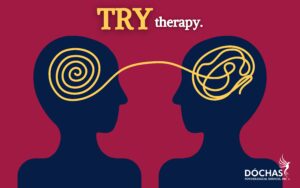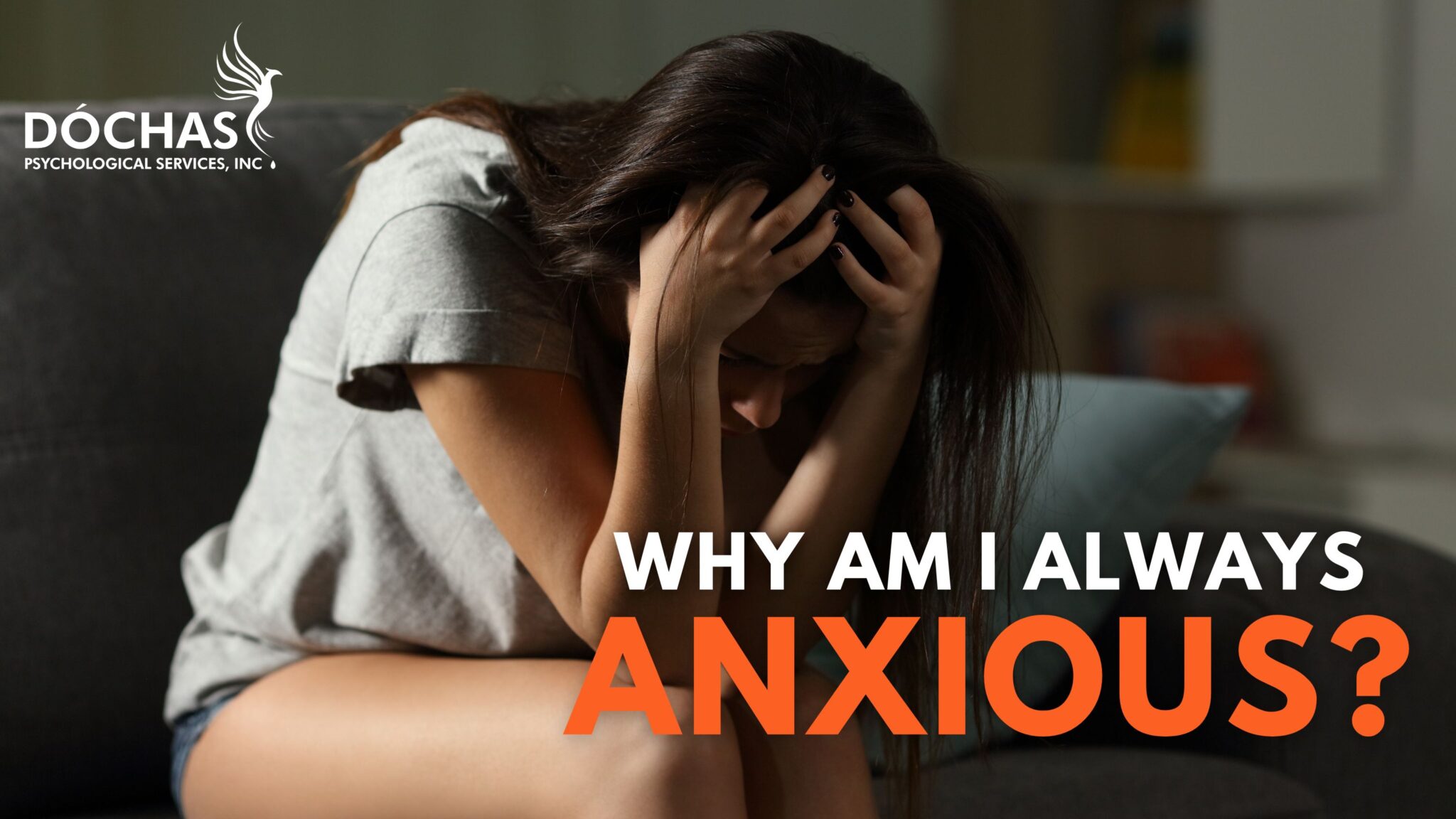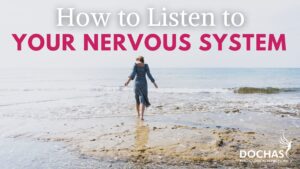Anxiety is a common and often misunderstood experience. For many, it can feel like a pervasive, inexplicable sense of dread or unease that arises seemingly out of nowhere. While anxiety can be triggered by specific situations, it can also emerge without a clear cause, leaving people wondering why they feel this way. It’s Pooja on the blog this week—to better understand anxiety, I’d like to explore the role of the nervous system and how somatic experiencing can shed light on this often complex emotion.

The Nervous System: A Constant Watchdog
At the core of anxiety lies the nervous system, a highly sophisticated network that constantly monitors our environment for threats. The nervous system’s primary role is to keep us safe, and it does so by reacting to potential dangers with a fight-or-flight response. This response is an automatic physiological reaction that prepares the body to either confront or flee from a perceived threat.
However, in today’s world, many of the threats we encounter are not physical dangers but rather psychological or emotional stressors. These can include everything from financial worries to relationship conflicts to the pressures of daily life. Our nervous system, however, doesn’t always distinguish between different types of threats. Whether the danger is real or imagined, physical or emotional, our body may still react with the same fight-or-flight response, which can manifest as anxiety.
Hyperarousal Leads to Anxiety
When the nervous system perceives a threat, it shifts into a state of hyperarousal. This state is characterized by increased heart rate, rapid breathing, muscle tension, and heightened alertness. While these reactions are helpful in the short term when responding to immediate dangers, they become problematic when sustained over time.
In our fast-paced, high-stress society, many people live in a state of chronic hyperarousal, where their nervous system is constantly on high alert. This can lead to persistent anxiety, as the body is perpetually prepared for a threat that may never come. Over time, this chronic state can wear down the nervous system, making it more reactive to even minor stressors and contributing to ongoing feelings of anxiety.
Somatic Experiencing
Somatic experiencing, a therapeutic approach developed by Dr. Peter Levine, offers a unique perspective on anxiety by focusing on how the body stores and processes stress and trauma. According to this approach, when we experience a traumatic event or prolonged stress, the nervous system may become overwhelmed and unable to fully process the experience. This can lead to a build-up of unprocessed energy in the body, which can manifest as anxiety.
For example, if someone has experienced a traumatic event that was never fully resolved, their nervous system might remain in a state of readiness, constantly scanning for similar threats. This unresolved trauma can lead to a heightened sensitivity to certain triggers, even if those triggers are not directly related to the original event. As a result, the person may experience anxiety in situations that others might find neutral or even safe.
Somatic experiencing helps individuals reconnect with their bodies and process these unresolved experiences. By focusing on bodily sensations and the nervous system’s response, people can begin to release the trapped energy associated with past stress or trauma, which can significantly reduce anxiety.
The Role of Unconscious Memories and Triggers in Anxiety
Another aspect of anxiety that somatic experiencing highlights is the role of unconscious memories and triggers. Our bodies often remember what our minds do not. Unresolved traumatic experiences can be stored in the body as implicit memories—memories that we are not consciously aware of but that influence our emotional and physiological responses.
These implicit memories can be triggered by sensory input (a sound, a smell, a sight) that the nervous system associates with the original traumatic event. When this happens, the body reacts as if the threat is present, even if there is no immediate danger. This can result in sudden, unexplained anxiety, as the nervous system attempts to protect the individual from a threat it perceives as real.
Strategies for Managing Anxiety

Understanding that anxiety often has deep roots in the nervous system and unprocessed experiences can be empowering. It shifts the focus from trying to control or suppress anxiety to learning how to work with the body and the nervous system in a compassionate way. Here are some strategies that can help:
- Grounding Techniques:
Grounding exercises help bring your attention to the present moment and reduce the intensity of anxiety. Simple techniques include focusing on your breath, noticing the physical sensations of your feet on the ground, or holding a comforting object.
- Body Awareness:
Practice tuning into your body and noticing where you feel tension or discomfort. By becoming more aware of these physical sensations, you can begin to understand how your body is responding to stress and start to release it.
- Mindful Movement:
Engaging in mindful movement practices such as yoga, tai chi, or gentle stretching can help calm the nervous system and release built-up tension. These activities encourage a connection between mind and body, promoting relaxation and reducing anxiety.
- Expressive Writing:
Journaling can be an effective way to process emotions and reduce anxiety. Writing about your feelings allows you to externalize them, making them more manageable. It can also help you identify patterns or triggers that contribute to your anxiety.
- Seek Professional Support:
If anxiety is significantly impacting your life, seeking support from a therapist, especially one trained in somatic experiencing, can be beneficial. Therapy can provide a safe space to explore the underlying causes of your anxiety and develop strategies for managing it. If you are looking for extra support with anxiety, please reach out to Dóchas at 780-446-0300 or info@dochaspsych.com. Book an in-person (Spruce Grove, Alberta) or virtual appointment with one of our therapists here.
- Create a Safe Environment:
Since anxiety is often linked to feeling unsafe, creating an environment where you feel secure can help soothe the nervous system. This could involve establishing routines, creating a calming space at home, or surrounding yourself with supportive people.
- Try the free Dóchas LifeJacket App!
The Dóchas Lifejacket is an app we created to help you regulate your emotions and manage stress. With just a few swipes, the app gives you personalized strategies based on how you feel in that moment that you can use to calm down. When you’re stressed out or feel like everything’s falling apart, our app does the thinking for you. It helps to support you in the moment, like a lifejacket, so that you don’t sink. Try out the LifeJacket App!
Listen to the Body’s Signals
Anxiety is not just a mental or emotional experience—it’s a full-body reaction rooted in the nervous system’s efforts to protect us. By understanding the physiological basis of anxiety and exploring therapeutic approaches like somatic experiencing, we can begin to address the root causes of our anxiety rather than just the symptoms. Learning to listen to our bodies, process unresolved experiences, and create environments that support relaxation can help us manage anxiety more effectively and find a greater sense of peace and well-being.
About Dóchas Psychological
Dóchas Psychological Services is a well-established and trusted therapy clinic located in Spruce Grove, Alberta. At Dóchas we value the idea that everyone deserves a safe space. Through connection and education, our team works hard to build a trustworthy relationship with each of our clients. It is our goal to create a community for our clients to feel like they belong.
Disclaimer
Information provided through Dóchas Psychological Services blogs or vlogs is meant for educational purposes only. They are NOT medical or mental health advice. You can read more about our disclaimer here.









